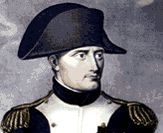 |
 |
 |
Napoleon Bonaparte (2)Emperor of France 12
Portraits of Napoleon Bonaparte
Desperate to be both at Britain and pushing his own reputation, Bonaparte planned an expedition to Egypt to threaten his foe's trading routes. He sailed from Toulon in 1798 and, after capturing Malta, made it to Egypt in early July. The campaign began brilliantly when he smashed the power of the ruling Mamelukes at the Battle of the Pyramids, but was crippled when Nelson's hound-pack fleet finally caught up with the French navy at Aboukir (Battle of the Nile) and sank all but four of the 17-ship force. Stranded and with suspect supply lines, Bonaparte moved into Syria and won the battle of Mt Tabor before being halted by fierce and stubborn resistance at Acre. Stricken with disease and wary of a mass revolt in Cairo, the French made a horrendous march through the deserts of the Sinai, but arrived at Aboukir in good enough condition to crush another Turkish force. Realising the potential success of his campaign was now limited, if not impossible, Bonaparte decided to abandon his army and get back to the centre of power - Paris - and make sure his position had not been undermined. Popular with the people, Bonaparte found the loathed Directory very cool towards his surprise arrival and no doubt took pleasure in their discomfort when he, Abbe Sieyes and Roger Ducos seized power in the Coup de Brumaire, which saw them share power as equal consuls. Within months Bonaparte was First Consul and had eased his "equals" into early retirement. The next stage in Bonaparte's career came in 1800, when he again moved into Italy with another brilliant manouevre that saw him lead the French army over the Alps and surprise the occupying Austrians. It almost proved to be a blunder - as Bonaparte was in turn caught by surprise at the tenacity of General Melas who attacked him at Marengo. Holding on for grim life the situation was saved for Bonaparte by General Louis Desaix's arrival with reinforcements and what was a lost battle became a stunning victory for the First Consul.
|
||
|
Napoleon
Bonaparte
|
|
| Career | Portraits |
| Quotes | Family |
| Loves | Letters |
| Plots | Murdered? |
| His will | Places |
|
Era
of Napoleon
|
|
| Powers | Opponents |
| Coalitions | Allies |
| People | Timelines |
| Key sites | Shrapnel |
|
Warfare
|
|
| Campaigns | Battles |
| Armies | Generals |
| Marshals | Winners |
| Glossary | Medical |
| Weapons | 1812 War |
| Uniforms | Battlefields |
|
War
at Sea
|
|
| Naval War | Heroes |
| Artworks | Signals |
| Nelson | Trafalgar |
|
Maps
|
|
| Key Maps | Peninsula |
| Animated | 1796/1800 |
| 1809 | Russia |
|
French
Revolution
|
|
| Revolution | Guillotine |
| Posters | People |
|
Art,
Film, Games
|
|
| Education | Goya |
| Sharpe | Hornblower |
| Books | Movies |
| DVDs | Music |
| Wargames | Images |
| Cartoons | Caricatures |
|
Other
|
|
| About Us | Sources |
| Awards | Sitemap |
| Links | Militaria |
| Miniatures | Reenactors |
| Forum | Quizzes |
| Home | Waterloo Diorama |
|
Napoleonic
Auctions
|
|
| General | Miniatures |
| Militaria | |
 After
masterminding the Peace of Campo Formio, Bonaparte returned to Paris
where he took command of the Army of England, an imposing force
neutered by England's wooden walls of its navy.
After
masterminding the Peace of Campo Formio, Bonaparte returned to Paris
where he took command of the Army of England, an imposing force
neutered by England's wooden walls of its navy.